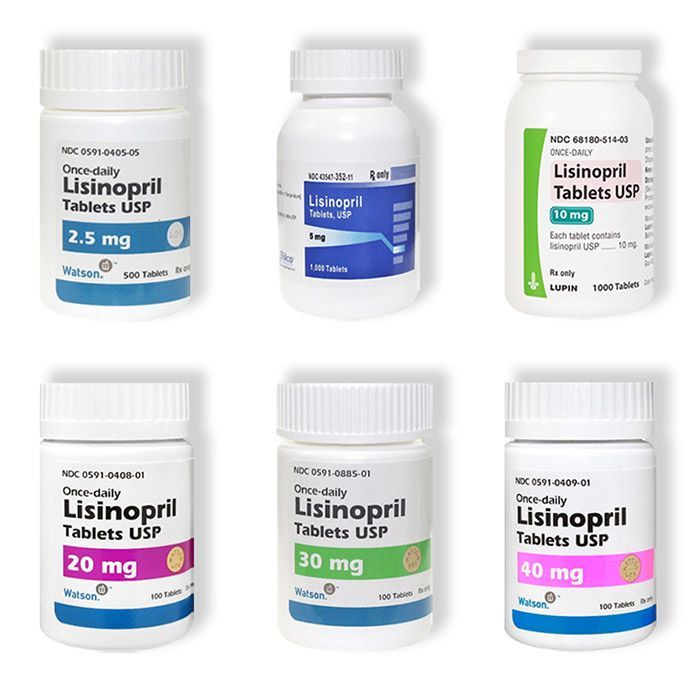Lisinopril - Generic Prinivil
Managing Blood Pressure
Lisinopril, the generic equivalent of Prinivil, a trusted medication for managing high blood pressure. Lisinopril effectively relaxes blood vessels, reducing the workload on the heart and supporting cardiovascular health. Choose Lisinopril for its proven efficacy in blood pressure management and its role in preventing complications associated with hypertension. Prioritize your heart health with Lisinopril, ensuring a balanced and well-supported approach to managing high blood pressure.
Before taking Lisinopril:
- Tell your doctor and pharmacist if you are allergic to lisinopril; other ACE inhibitors such as enalapril (Vasotec, in Vaseretic), benazepril (Lotensin, in Lotrel), captopril (Capoten), fosinopril (Monopril), moexipril (Univasc, in Uniretic), perindopril (Aceon), quinapril (Accupril, in Accuretic, in Quinaretic), ramipril (Altace), and trandolapril (Mavik, in Tarka); any other medications; or any ingredients in lisinopril tablets. Ask your pharmacist for a list of the ingredients
- Tell your doctor or pharmacist if you are taking valsartan and sacubitril (Entresto) or if you have stopped taking it within the last 36 hours. Your doctor will probably tell you not to take lisinopril, if you are also taking valsartan and sacubitril. Also, tell your doctor if you have diabetes and you are taking aliskiren (Tekturna, in Amturnide, Tekamlo, Tekturna HCT). Your doctor will probably tell you not to take lisinopril if you have diabetes and you are also taking aliskiren.
- Tell your doctor and pharmacist what prescription and nonprescription medications, vitamins, nutritional supplements, and herbal products you are taking. Be sure to mention any of the following: aspirin and other nonsteroidal anti-inflammatory drugs (NSAIDs) such as indomethacin (Indocin, Tivorbex); diuretics ('water pills'); lithium (Lithobid); and potassium supplements. Your doctor may need to change the doses of your medications or monitor you carefully for side effects.
- Tell your doctor if you have or have ever had heart or kidney disease; diabetes; lupus; scleroderma (a condition in which extra tissue grows on the skin and some organs); or angioedema (a condition that causes difficulty swallowing or breathing and painful swelling of the face, throat, tongue, lips, eyes, hands, feet, ankles, or lower legs).
- Tell your doctor if you are breastfeeding
- if you are having surgery, including dental surgery, tell the doctor or dentist that you are taking lisinopril
What if I miss a dose?
If you forget a dose, take the missed dose as soon as you remember it. However, if it is almost time for the next dose, skip the missed dose and continue your regular dosing schedule. Do not take a double dose to make up for a missed one.
Lisinopril may cause side effects. Tell your doctor if any of these symptoms are severe or do not go away:
- cough
- dizziness
- headache
- excessive tiredness
- nausea
- diarrhea
- weakness
- sneezing
- runny nose
Some side effects can be serious. If you experience any of these symptoms, call your doctor immediately:
- swelling of the face, throat, tongue, lips, eyes, hands, feet, ankles, or lower legs
- hoarseness
- difficulty breathing or swallowing
- fever, sore throat, chills, and other signs of infection
- yellowing of the skin or eyes
- lightheadedness
- fainting
- chest pain
Lisinopril may cause other side effects. Call your doctor if you have any unusual problems while taking this medication.
In case of overdose, call the poison control helpline at 1-800-222-1222. Information is also available online at https://www.poisonhelp.org/help. If the victim has collapsed, had a seizure, has trouble breathing, or can't be awakened, immediately call emergency services at 911.
Symptoms of overdose may include the following:
- lightheadedness
- fainting
Keep all appointments with your doctor and the laboratory. Your blood pressure should be checked regularly to determine your response to lisinopril. Your doctor may order certain lab tests to check your body's response to lisinopril.

